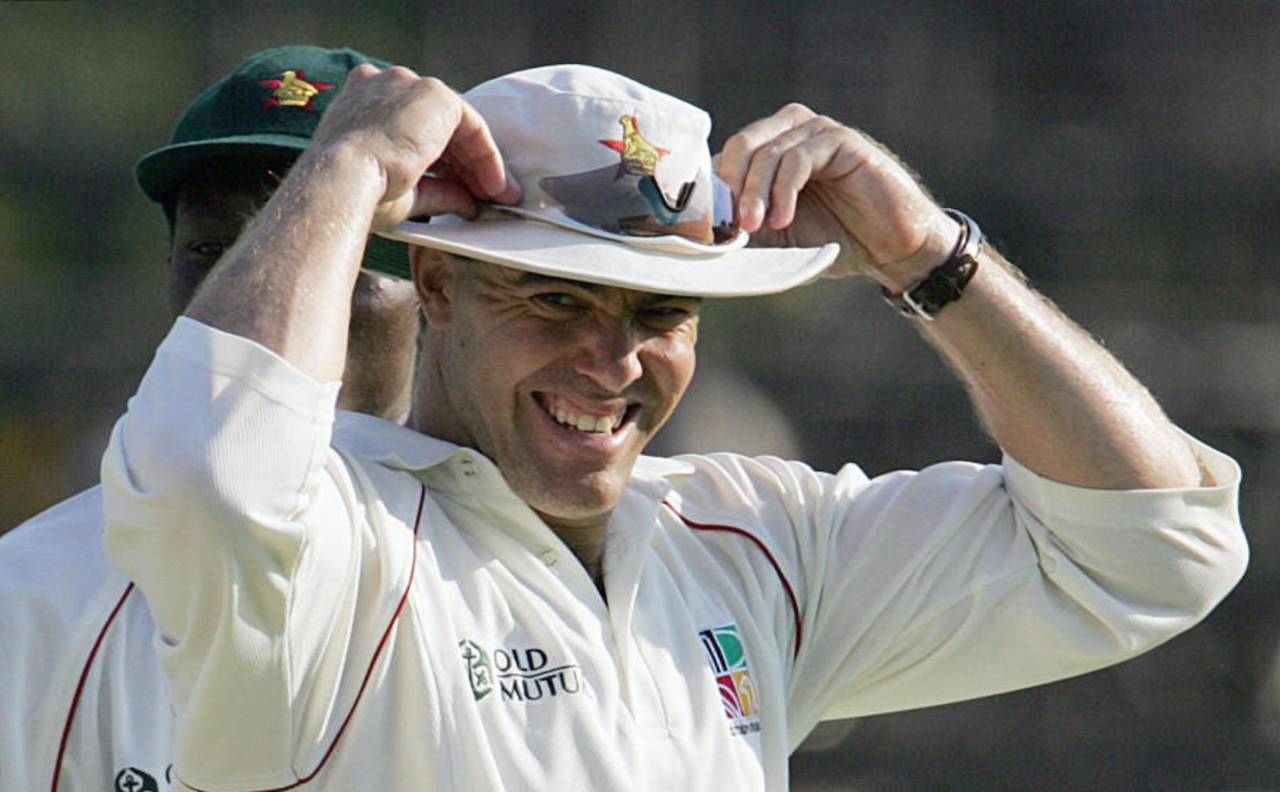At the start of the 1995 English summer, my last in first-class cricket after 18 years with Hampshire, we were engaged in a pre-season "friendly" with Sussex. Stationed at cover-point was our newly recruited overseas player: thick-set and strong, with a deceptive turn of speed, and the most wonderful eye for the ball.
The Sussex opening batter cut hard to an area just behind point for what appeared to be a certain boundary off the first ball of the match. The fielder, who was naturally right-handed, threw himself to his left just as a goalkeeper might, and the ball smacked into the palm of his left hand. In one movement he rolled his body 180 degrees, sprung upright like a big cat threatened, and with the ball now cleverly transferred to his right hand, he took aim. The throw was wizard, flat and screaming, and hit one stump flush with the sound of perfect contact echoing around the small and empty ground. It was a breathtaking moment.
That man was
Heath Streak. It was with the heaviest heart that I read earlier this week of
his passing aged just 49. I knew little of the cancer or of his new life but I knew him well back then and did not meet a better man. Modest and quietly spoken, his simple life as farmer, hunter and cricketer had become a complex one of leadership, politics and punishment. He kept sanity through wonderful parents, an extraordinary wife and lively children. He lost some battles but the hardest for any of those loved ones to take was the last one.
I first met him as a boy who played cricket in the bush with the kids whose parents worked the family farm.
Denis, his father, briefly served time in prison for raging against Robert Mugabe's land-reclaim initiative that took much of the Streak farm, a magnificent place in Matabeleland about 50 miles from Bulawayo. His mother, Shona, stayed calm and strong through the traumatic experiences of those bewildering days, and somehow the Streaks managed, with about a tenth of what they once had, to keep a few cattle and make a turn from a small safari park.
On my various cricket tours and holidays to Zimbabwe, their hospitality knew no boundary. In 1990 with an England A team that included the likes of Michael Atherton and Graham Thorpe, we stayed a couple of nights to ride horses, swim, play tennis and barbecue. Denis was a good enough seam bowler to have played for Zimbabwe himself, and on one balmy afternoon, we set up stumps and took guard against a couple of Streaks, each of whom made us think and, occasionally, even duck and weave. As the sun set, beer was drunk and the fire burned, and we told stories in the evening shadows and laughed until the stars in the sky laughed with us.
Streak junior was a magnificent cricketer, all power, wit and will. Hampshire lost the first three Championship games of the 1995 season, and while reviewing the roles of every player in the team, I urged Heath to drop the modesty and get us winning a few matches. He did, and how! We went on a splendid run, climbing the Championship table to near dizzying heights before settling on the right place for our talent pool at the time, somewhere around mid-table. He bowled a heavy ball fast-medium, swung it late and never gave an inch. He smashed it long but was rarely in for long enough to fully justify that keen eye. He fielded as if he were fighting a war.
Of course, it was the war at home that did for him. Made captain of Zimbabwe, he refused to play the political game. Specifically and publicly, Streak objected to the quota system that demanded at least five black players in the national team. His refusal to toe the line cost him his job. Upon the announcement of his sacking (the board's explanation was that he had resigned),
13 white players stood down from the Zimbabwe team. Streak later returned to the side, albeit briefly, before retiring at 31 years of age.
Having taken over the captaincy of the weakest team in international cricket in 2000, he led them successfully,
winning four in 21 Tests and
18 of 65 ODIs. "Our talisman who single-handedly won many games for us," wrote Henry Olonga, the Zimbabwe seam bowler, in his autobiography.
In essence, he made a mistake and fell foul of the ICC's anti-corruption code. From it came an unfairly long eight-year ban, but even that could not wither his desire to return to coaching when it was over.
Perhaps the cancer within came from the stress of an always challenging life played out mainly against the odds. It is heartbreaking to think of what Heath had been through and how early he has gone. Cricket can wrap its arms around you or spit you out on the sidewalk of life.
I cannot help but think of Denis and Shona, Nadine and the kids, these fabulous people and their loss. They know best that this was a man who gave everything to every moment of his time on earth and that Zimbabwean sport, cricket in general we can say, owes him a great debt.
For Denis, at least, there is the tiniest consolation. In 1995-96, he and Heath
played a first-class match for Matabeleland together. Not many a father and son can say that. Right now, we can only say goodbye to our African friend and wish him peace at last and for evermore.

